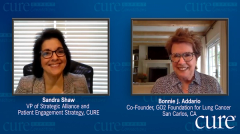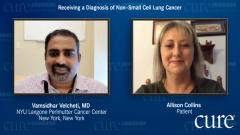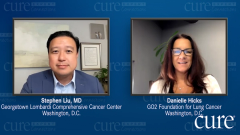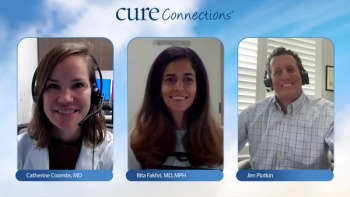
Biomarker Testing in Non-Small Cell Lung Cancer
Stephen Liu, MD, and Danielle Hicks describe the purpose and the importance of biomarker testing in non-small cell lung cancer.
Episodes in this series

Stephen Liu, MD: Hello, and welcome to CURE Expert Connections. I’m Dr. Stephen Liu, Director of Thoracic Oncology at Georgetown Lombardi Comprehensive Cancer Center in Washington, D.C. I’d like to welcome Danielle Hicks, the Chief Patient Officer at the GO2 Foundation for Lung Cancer, to our program “The Importance of Biomarkers and Biomarker Testing in Non-Small Cell Lung Cancer.” Thanks for joining, Danielle.
Danielle Hicks: Thanks for having me.
Stephen Liu, MD: So, biomarker testing is absolutely essential for the proper management of lung cancer. And when we talk about biomarkers, we’re talking about something we can reliably and consistently measure on a cancer that’s going to tell us something about that cancer. And sometimes it tells us about the behavior, it tells us about the prognosis, but most importantly here, it’s going to tell us the optimal way in which to treat that cancer biomarker testing now.
This is something that’s not optional; it’s not an academic exercise that’s just done for our own edification. It really is essential for the optimal treatment of anyone with advanced lung cancer. Anyone who is diagnosed with advanced lung cancer requires therapy, and that therapy is completely dependent on biomarker testing. So, my opinion... really, anyone who is diagnosed with advanced lung cancer should undergo biomarker testing upfront. But Danielle, maybe you can speak to the importance of that molecular testing in patients with lung cancer.
Danielle Hicks: Yeah, I’d love to, and I think you touched on [biomarker testing], and it’s one of the very first things we talk about with patients who call us at GO2 looking for support and education on their disease. Biomarker testing, as you said, is not optional. It should be, and is, I guess, a mandatory diagnostic test that’s oh-so important to each and every individual patient just to determine what their cancer looked like. You know, we talk to patients and patients here all the time about precision medicine or personalized medicine, and this really is sort of at the forefront of what personalized medicine looked like and identifying whether or not you have a target, a biomarker, a protein. You know, whatever it may be, where there is an FDA-approved therapy, it is absolutely, in most cases, the best first-line treatment for that patient.
Stephen Liu, MD: I mean, it really highlights different cancers. When we have someone who may be diagnosed with breast cancer, we can see that that’s clearly different from a lung cancer. It behaves differently biologically, and it’s treated very differently. But within lung cancer, there are many different types of cancers that may all occur within the lung or may start in lung tissue, but they are very, very different. And if we can appreciate those differences, then we can leverage those. We can exploit those; we can use those differences as vulnerabilities. And when we’re trying to plan a rational course of treatment for a newly-diagnosed lung cancer, we want to understand what those vulnerabilities are so that we try to eliminate some of the guesswork and really go for something that we’re much more confident will work.
When we think of something like cytotoxic chemotherapy, we give traditional chemotherapy for some [types] of advanced lung cancer. We expect that to significantly shrink the cancer 15 to 30 percent of the time. It’s not a lot. But if we can identify a specific biomarker, a specific vulnerability, and deliver a paired targeted agent, the response rates may be as high as 90%, so we’re much more confident. It takes a lot of the guesswork out by delivering the right treatment really to the right person. But molecular testing is something that needs to be done upfront, and I think that we’re maybe not as good at testing as we should be. Do you think that’s a fair statement, Danielle?
Danielle Hicks: I think it’s absolutely a fair statement. There are disparities across the board when it comes to who is or who is not getting tested, as well as what type of testing they’re getting, right? Whether it’s a comprehensive test where they’re looking across a couple to 400 different types of potential markers versus the 7, 9, 10, or 11 that are more commonly looked for in lung cancer.
Stephen Liu, MD: So, we have a growing list, and it’s changing very rapidly. Now, we are familiar for many years with mutations in EGFR, with fusions in ALK. When we find those, we have approved targeted agents that are very effective, that are very well tolerated, but if we give those exact same drugs to someone that doesn’t have those biomarkers, the chance of them working is zero percent. They will only work if there is that match in there. And the field moves so quickly, and we identify new biomarkers, and we have new drugs approved all the time, that sometimes it’s a little hard to keep up.
I always encourage patients to have a conversation with their physician if I’m seeing a second opinion or if I have another contact; this really is a two-way street. When you have a conversation, you engage your healthcare provider, but sometimes it can be difficult because there’s a lot of terminology and there are a lot of phrases that we use. So, if a patient were to contact you, Danielle, and say, “I want to have a discussion about biomarkers with my oncologist,” what advice would you give? What kind of terminology do you think they need to know?
Danielle Hicks: Yeah, it’s interesting that you should ask that because there are so many different ways to describe what it is we’re talking about here today. I think that also generates and causes confusion among the patient community. Because quite often, if I say, “Well, did you have molecular testing?”, they’re like, “No, no, no, but I had genomic profiling.” Or, “I had biomarker testing.” “Or, or, or,” right? So, one of the things that non-profits are trying to do and come together and collaborate on is calling it one thing that will sort of encompass all of the testing. And the word that we chose to use is biomarker. But with that being said, the discussion always begins with people making sure that people understand what biomarker testing means, what the different ways it might be referred to [are], as well as the ‘why’ behind the biomarker testing. And that’s when we get into some of the targeted therapies and things that would be appropriate based on what those results are.
We also explain to him that, to folks, that things are happening so fast and furiously, which is why we are huge proponents for the comprehensive tests. Because even if they don’t test positive for one of the biomarkers that does have an FDA-approved therapy, they may qualify for [a] clinical trial that is showing great promise in a certain biomarker that has yet to have an FDA-approved drug.
Stephen Liu, MD: That’s a huge point, and something I see in my practice. We have a list of mutations, and for many years, there were four mutations and infusions, four biomarkers, they were looking for: EGFR, ALK, ROS1, and BRAF. And now, there are at least 8, and at any moment, another one could be added. So, we have different ways as oncologists that you can order [the biomarkers]. I can have a biopsy here that’s done, shows me it’s lung cancer. And I can send [the biopsy] to a lab, and like an à la carte menu, choose which biomarkers I’m testing that will be single gene testing. Or, I can say, “Test for everything.” We call that comprehensive or next-generation sequencing.
And there’s more and more data that suggest that’s probably the better way to do it. It is, in the long run, more cost effective. It is a little faster if you’re looking at sequencing the different tests. If you end up doing one test and another and another, you use a lot of time, you use a lot of tissue. And importantly, you don’t necessarily need to go back and test. And so, if tomorrow, a new biomarker was identified and approved, you wouldn’t have to retest; you would have all that information out in front of you. And so, that’s why the comprehensive testing is important.
Transcript edited for clarity.



